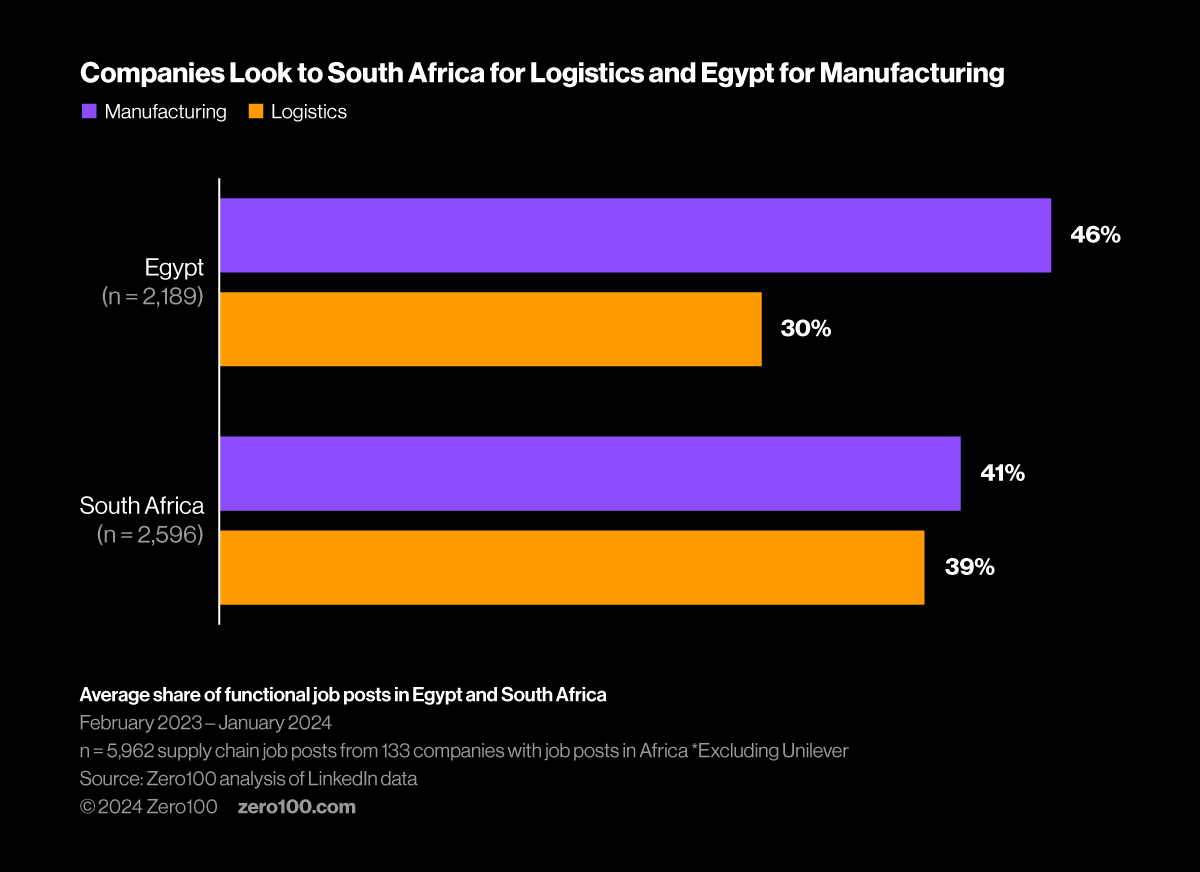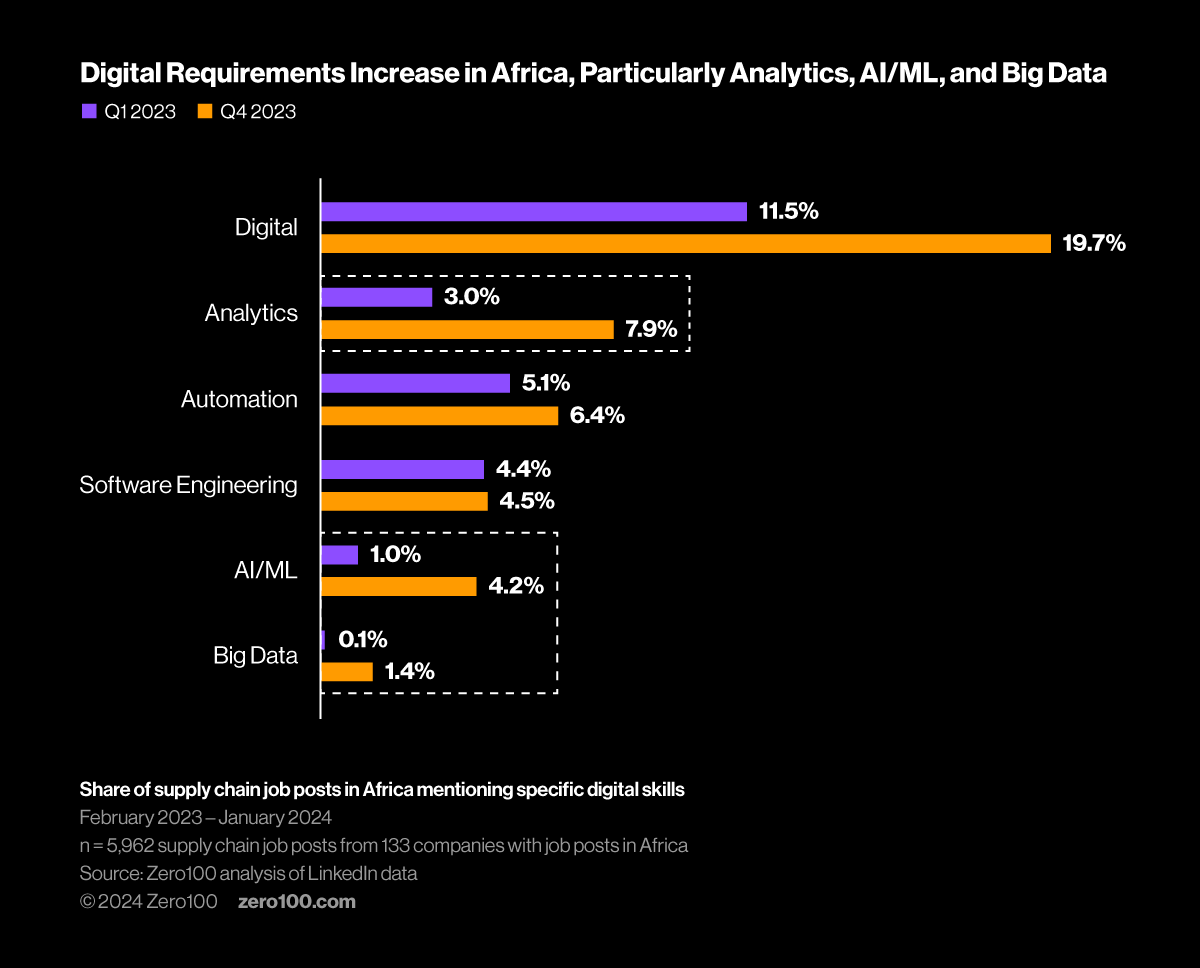
It’s Africa’s Moment to Leap Forward in the AI Revolution
A growing population, untapped data, a rich agricultural landscape, and rising tech talent... just a few opportunities in Africa that make it an ecosystem poised for digital transformation in 2024. Here’s why some of the most successful global companies are investing in digital talent and infrastructure there.
Earlier this year, we predicted 10x growth in corporate supply chain roles in India, Mexico, and… the continent of Africa. But, why Africa?
A growing population, untapped data, a rich agricultural landscape, and rising tech talent are just a few areas of opportunity across an ecosystem poised for digital transformation. Now, the most successful global companies are taking note of supply chain implications and investing in digital talent and infrastructure there.
Untapped Data = AI Potential
Africa holds 17% of the world’s population. It’s growing at a rate of 2.7% per year – more than double that of South Asia or Latin America – and forecasted to be home to 25% of the world’s population by 2050. Both a promising workforce and a promising global customer base. However, African data remains largely untapped – crucial for making AI contextually relevant in local markets and the perfect training ground for globally diverse models due to the vast cultural landscape across the continent. Inclusive AI models equal better results (with less hallucination).
Yet, despite being a significant portion of the global population, the digital infrastructure is lagging, with only 1.8% of the world’s data centers residing in Africa, primarily in South Africa, Egypt, and Morocco. Internet penetration rates across Africa are at 43%, compared to the 66% global average.
Companies like Teraco and Equinix are among the largest investors in data centers in Africa, with Google, Amazon Web Services, and Microsoft also in the mix. Notably, Chinese telecommunications giant Huawei has taken a particular interest. A total investment of $430 million is planned in Northern Africa as part of their effort to accelerate AI and digitization through cloud and software ecosystems as well as talent. Huawei is committed to “In Africa, For Africa” on the road to 5G readiness, feverishly recruiting Moroccan engineers and offering training and financial aid – a part of wider efforts by China to extend its influence in the "global south."
Accelerating Productivity and Availability
Agricultural output in Sub-Saharan Africa has gone up 6x since 1960 compared to the rest of the world (4x). But to produce more output, land, labor, and machinery inputs have been significantly greater – and today, Africa trails the rest of the world in agricultural productivity by nearly 60%.
The competition for natural resources in the context of climate change, the growing demand for minerals with electrification, and the increasing difficulty of farming as a career path are converging in a rivalry between non-consumable materials and agriculture. The steady and long-term decline of cocoa bean production out of Ghana (at 580 metric tons now, nearly half of what it was in 2020), provides a recent example – diseased crops and illegal mining now threaten both local farmers' livelihoods and the surety of cocoa supply fueling your next chocolate bar fix. With input costs rising from a volatile and competitive supply landscape, productivity is as important as availability.
Once again, enter AI – the next digital revolution and “an indispensable technology for agriculture,” according to Amanda McClerren, CIO for Bayer’s Crop Science Division. Bayer is piloting genAI to tackle this, with an LLM trained on years of proprietary agronomic data proven to unlock productivity with expert answers in minutes and not days, and the potential for farmers to query their own farm data in the future. A huge potential unlock for agricultural productivity in Africa.
Reassess Talent Strategy across Africa – Now.
Funding for AI/deep tech startups in Africa reached nearly $450 million in 2023. And tech talent is growing every day with upskilling programs like Zindi, which connects organizations with African data scientists; Gebeya, a marketplace for African tech talent; and She Hacks Africa, a hands-on coding and product design boot camp for African youth focused on building self-confidence.
Zero100 data scientists captured a total of 16k roles posted in Africa across 113 companies on LinkedIn between February 2023 and January 2024. The data suggests that digital leaders – those with the highest mention of digital skills in supply chain jobs, demonstrating the ability to cascade CEO strategy with precision to the work-task level – are nearly 3x more likely to hire for digital skills in Africa. The hiring market is particularly robust in Egypt and South Africa. But we also have a close eye on Rwanda, which continues to be a hotspot for innovation, uniting the private and public sectors to fuel African start-up growth.

Of the 16k roles, 37% are in supply chain, with the top companies recruiting in Africa – PepsiCo, Unilever, and Nestlé, to name a few – hiring for planning and sourcing roles. While many roles suggest localization, a business process outsourcing market exists too. And digital requirements for roles posted in Africa rose between Q1 and Q4 2023, with the most notable being analytics at a rate of 2.6x, AI/ML (4.2x), and big data (14x). There is incredible momentum for digital transformation.

Natalie Jabangwe, the timbuktoo African Innovation Foundation’s interim executive secretary, said it best: “This is Africa’s moment. And we must stand up for the continent now.”